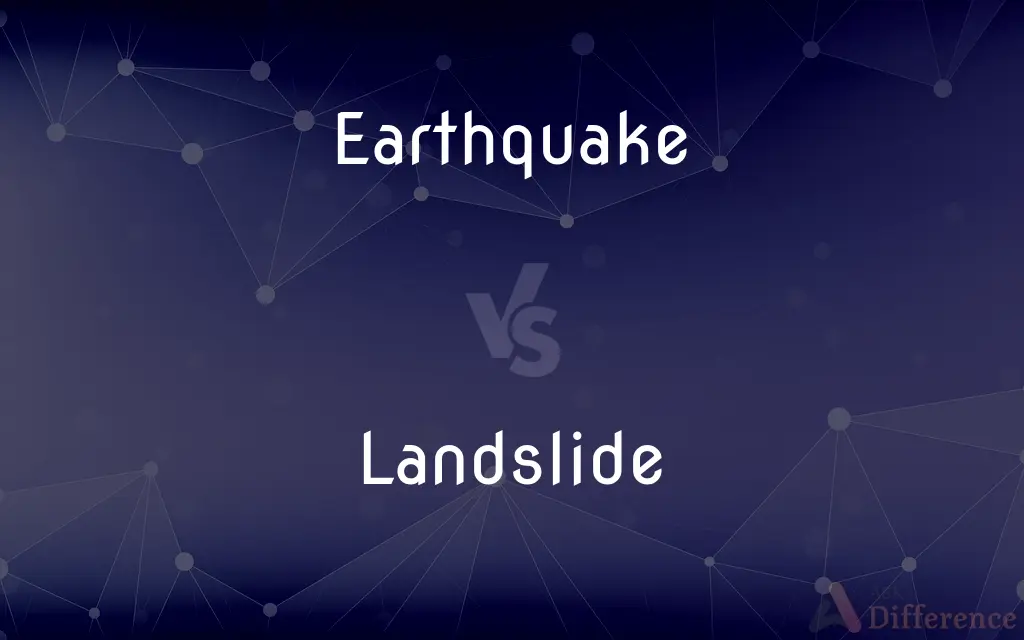Earthquake vs. Landslide — What's the Difference?
Edited by Tayyaba Rehman — By Urooj Arif — Updated on March 21, 2024
An earthquake is a sudden, violent shaking of the ground, typically due to tectonic movements, while a landslide involves the movement of rock, earth, or debris down a slope.

Difference Between Earthquake and Landslide
Table of Contents
ADVERTISEMENT
Key Differences
Earthquakes occur due to the release of energy from the Earth's crust, creating seismic waves that cause the ground to shake. This phenomenon can happen anywhere in the world but is most common along tectonic plate boundaries. Whereas landslides are triggered by factors like heavy rain, earthquakes, volcanic activity, or human actions, leading to the downward and outward movement of slope materials.
The primary cause of an earthquake is the movement of tectonic plates, either sliding past one another or colliding. This contrasts with landslides, which can be caused by a variety of factors, including but not limited to the destabilization of land due to water saturation, earthquakes, volcanic eruptions, or human activity such as deforestation or construction.
Earthquakes can affect vast areas, with their impact felt over hundreds or even thousands of kilometers from the epicenter, depending on their magnitude. Landslides, on the other hand, tend to have a more localized effect, impacting areas directly along the slope and at the base where the debris settles.
In terms of prediction and prevention, earthquakes are difficult to predict with high accuracy, and prevention is mainly focused on constructing buildings and infrastructure that can withstand seismic forces. Conversely, the risk of landslides can often be assessed and mitigated through slope management, drainage control, and by avoiding construction on steep slopes or known landslide-prone areas.
The aftermath of earthquakes can lead to secondary disasters, such as tsunamis, aftershocks, and landslides, highlighting their potential to trigger other natural hazards. Landslides themselves can block rivers, leading to flooding, or bury homes and roads, causing significant property damage and potentially loss of life, but they do not usually have as wide-ranging secondary effects as earthquakes.
ADVERTISEMENT
Comparison Chart
Definition
Sudden shaking of the ground due to tectonic movements.
Movement of slope materials down a slope.
Primary Cause
Movement of tectonic plates.
Water saturation, earthquakes, human activity.
Affected Area
Can be widespread, across hundreds of kilometers.
Generally localized to slopes and adjacent areas.
Prediction and Prevention
Difficult to predict, focus on resistant construction.
Risk assessment and slope management can mitigate.
Secondary Effects
Tsunamis, aftershocks, landslides.
Can block rivers or bury structures, causing damage.
Compare with Definitions
Earthquake
Results in ground shaking that can damage structures and lead to loss of life.
The earthquake caused buildings to collapse, trapping many.
Landslide
Can result in significant property damage and pose a risk to life.
A massive landslide buried several homes in the valley.
Earthquake
Can lead to other natural disasters.
The earthquake triggered landslides in the surrounding hills.
Landslide
May block rivers, leading to flooding.
The landslide created a natural dam, causing the river to overflow.
Earthquake
A natural event caused by the shifting of tectonic plates beneath the Earth's surface.
The 2011 Tohoku earthquake in Japan triggered a devastating tsunami.
Landslide
Often caused by saturation of the soil from rainfall or seismic activity.
The landslide was precipitated by days of intense rainfall.
Earthquake
Can occur along fault lines where plates meet.
The San Andreas Fault is known for frequent earthquakes.
Landslide
Mitigation includes drainage control and slope stabilization.
To prevent future landslides, engineers installed drainage systems on the slope.
Earthquake
Measured in magnitude on the Richter scale.
A 7.0 magnitude earthquake hit the city, causing widespread panic.
Landslide
The downward movement of rock, earth, and debris on a slope.
Heavy rains triggered a landslide that blocked the road.
Earthquake
An earthquake (also known as a quake, tremor or temblor) is the shaking of the surface of the Earth resulting from a sudden release of energy in the Earth's lithosphere that creates seismic waves. Earthquakes can range in size from those that are so weak that they cannot be felt to those violent enough to propel objects and people into the air, and wreak destruction across entire cities.
Landslide
The term landslide or, less frequently, landslip, refers to several forms of mass wasting that may include a wide range of ground movements, such as rockfalls, deep-seated slope failures, mudflows, and debris flows. Landslides occur in a variety of environments, characterized by either steep or gentle slope gradients, from mountain ranges to coastal cliffs or even underwater, in which case they are called submarine landslides.
Earthquake
A sudden movement of the earth's crust caused by the release of stress accumulated along geologic faults or by volcanic activity. Also called seism, temblor.
Landslide
The downward sliding of a relatively dry mass of earth and rock.
Earthquake
A shaking of the ground, caused by volcanic activity or movement around geologic faults.
Landslide
The mass that slides. Also called landslip.
Earthquake
(planetary geology) Such a quake specifically occurring on the planet Earth, as opposed to other celestial bodies.
Landslide
A percentage of votes greatly exceeding the required margin of victory.
Earthquake
(figuratively) A sudden and intense upheaval; a severely disruptive event.
Landslide
An election that sweeps a party or candidate into office.
Earthquake
(intransitive) To undergo an earthquake.
Landslide
A great victory.
Earthquake
A shaking, trembling, or concussion of the earth, due to subterranean causes, often accompanied by a rumbling noise. The wave of shock sometimes traverses half a hemisphere, destroying cities and many thousand lives; - called also earthdin, earthquave, and earthshock.
Landslide
A natural disaster that involves the breakup and downhill flow of rock, mud, water and anything caught in the path.
Earthquake
Like, or characteristic of, an earthquake; loud; startling.
The earthquake voice of victory.
Landslide
A vote won by a wide or overwhelming majority.
The candidate won by a landslide.
Earthquake
Shaking and vibration at the surface of the earth resulting from underground movement along a fault plane of from volcanic activity
Landslide
To undergo a landslide.
Earthquake
A disturbance that is extremely disruptive;
Selling the company caused an earthquake among the employees
Landslide
The slipping down of a mass of land from a mountain, hill, etc.
Landslide
The land which slips down.
Landslide
An election victory in which the winning candidate receives a substantial majority of the votes, usually meaning at least ten per cent more than any opposing candidate.
Landslide
Any overwhelming victory.
Landslide
An overwhelming electoral victory;
Roosevelt defeated Hoover in a landslide
Landslide
A slide of a large mass of dirt and rock down a mountain or cliff
Common Curiosities
How can we protect ourselves from earthquakes and landslides?
For earthquakes, building earthquake-resistant structures and practicing evacuation plans; for landslides, avoiding construction in prone areas and implementing slope stabilization measures.
How are landslides and earthquakes detected?
Earthquakes are detected using seismographs, which measure ground vibrations. Landslides are harder to predict, but risk assessments and monitoring of vulnerable slopes can provide warnings.
Can an earthquake cause a landslide?
Yes, the shaking from an earthquake can destabilize slopes, leading to landslides.
What role does water play in landslides?
Water saturation from rainfall, melting snow, or other sources can weaken soil and rocks on slopes, making them prone to sliding.
Are earthquakes more dangerous than landslides?
Both can be extremely dangerous, but earthquakes can affect larger areas and have wider-reaching secondary effects, including triggering landslides.
Can we predict earthquakes and landslides?
Earthquakes cannot be predicted with precise timing, but seismic activity can be monitored for potential risks. Landslide risks can often be assessed based on slope conditions and rainfall.
How do insurance companies assess risks from earthquakes and landslides?
Insurance companies use historical data, geographic information, and models to assess and price the risk of damage from these natural events.
What's the main difference between an earthquake and a landslide?
The main difference is their cause: earthquakes result from tectonic movements, while landslides are caused by the movement of materials down slopes, often triggered by saturation, seismic activity, or human interference.
Is living near a fault line dangerous?
Living near a fault line increases the risk of experiencing earthquakes, so it's important to take precautions like retrofitting buildings to withstand shaking.
What should you do immediately after an earthquake or landslide?
Ensure personal safety, check for injuries, avoid damaged buildings or slopes, and follow local emergency services' advice.
What are the long-term effects of earthquakes and landslides?
Both can lead to loss of life, damage to infrastructure, and long-term economic impacts. Earthquakes can also change landscapes and lead to other natural disasters.
Why do earthquakes happen more frequently in certain areas?
Earthquakes are more common along tectonic plate boundaries where plates collide, separate, or slide past each other.
Can landslides be beneficial in any way?
While generally destructive, landslides can create new habitats, redistribute nutrients, and form natural dams, contributing to ecological diversity.
What is the impact of human activity on landslides?
Deforestation, construction, and other human activities can destabilize slopes and increase landslide risk.
How can technology help in managing the risks of earthquakes and landslides?
Technology can assist through early warning systems, improved construction techniques, and satellite monitoring to identify risk areas for landslides.
Share Your Discovery

Previous Comparison
Colt vs. Fole
Next Comparison
Legibility vs. ReadabilityAuthor Spotlight
Written by
Urooj ArifUrooj is a skilled content writer at Ask Difference, known for her exceptional ability to simplify complex topics into engaging and informative content. With a passion for research and a flair for clear, concise writing, she consistently delivers articles that resonate with our diverse audience.
Edited by
Tayyaba RehmanTayyaba Rehman is a distinguished writer, currently serving as a primary contributor to askdifference.com. As a researcher in semantics and etymology, Tayyaba's passion for the complexity of languages and their distinctions has found a perfect home on the platform. Tayyaba delves into the intricacies of language, distinguishing between commonly confused words and phrases, thereby providing clarity for readers worldwide.
















































